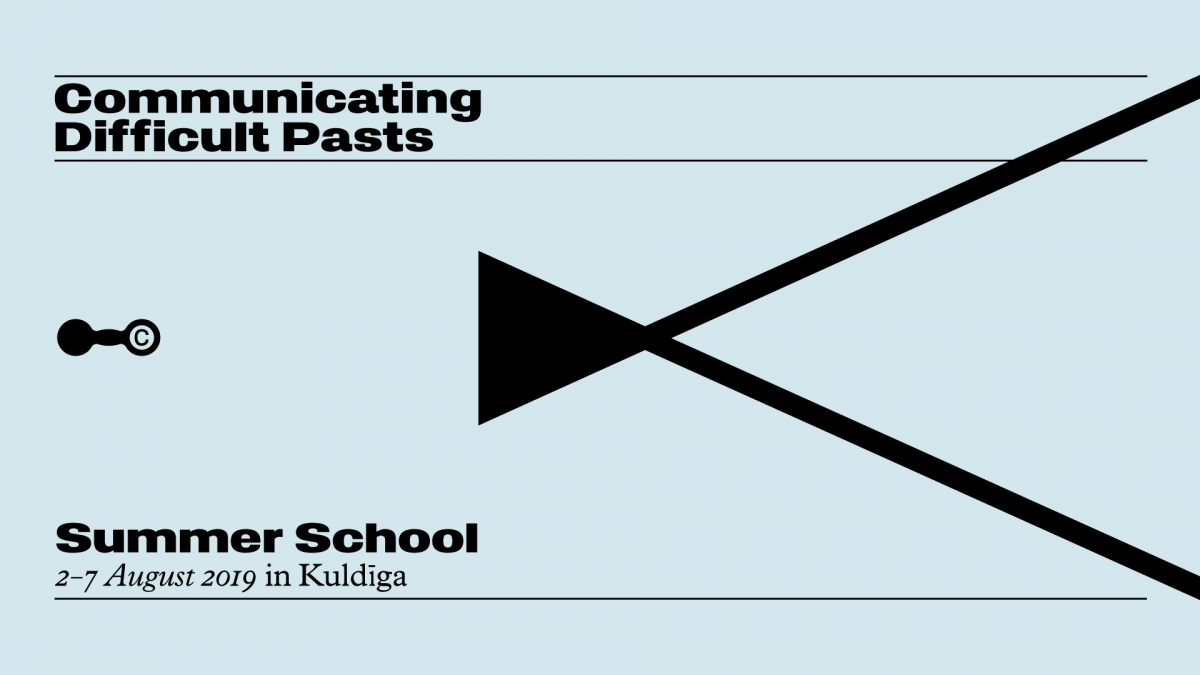
The Summer School of the Latvian Centre for Contemporary titled Communicating Difficult Pasts, 2 – 7 August, gathers young artists, researchers and curators from the Baltic region and other European countries. The focus of the summer school will be how violent pasts remain with us and how contemporary artistic research and curatorial projects have found ways to mediate their different dimensions. How do we start communicating about sensitive pasts when in public discourse they are covered by silence? What tactics can shift conversations when exclusive and selective memories are used as the only relevant departure points? In which ways can competing traumas be overcome in the Baltic region? Moreover, we will ask questions about the future of difficult memories and the role of digital technologies. The chance and challenge of this summer school will be its comparative gaze and the opportunity to think through how frameworks and concepts translated from different contexts can help us deal with local erasures and help complicate the narratives of history.
The programme of the summer school will include workshops and talks, led by distinguished thinkers and experts in the fields of visual art, cultural history and theory, as well as memory, feminist and LGBTQ+ studies. The speakers include Ilya Lensky, Director of the Museum ‘Jews in Latvia’, Adi Kunstman, Senior Lecturer from the Manchester Metropolitan University, Violeta Davoliūtė, Professor at the Institute of International Relations and Political Science, Vilnius University, and artists Harri Pälviranta, Máret Ánne Sara, Kristina Norman, Jūratė Samulionytė and Vilma Samulionytė. The curators of the Summer School programme are Ieva Astahovska and Margaret Tali.
The summer school program will start on Friday 2 August with the workshop / guided tour by Ilya Lensky Mapping the (Post-)Jewish Space of Kuldīga. During this tour participants will try not only to see the surviving Jewish sites, but will also discuss the processes behind forgetting and remembering the Jewish community in this town.
On Saturday 3 August Adi Kuntsman in her talk Seeing the Unseen, Researching the Unspeakable, Imagining the Unimaginable will explore the conceptual, methodological and political dilemmas of researching difficult pasts and contested or culturally or politically ‘illegitimate’ memories. Her talk will do so in the contexts of silence, on the one hand, and violence, on the other, where the distinctions between ‘heroes’ and ‘enemies’, ‘witnesses’ and ‘gatekeepers’ and ‘victims’ and ‘perpetrators’ can be blurred or reversed.
On Sunday 4 August Sámi artist and writer Máret Ánne Sara will talk about her work Pile o´Sápmi that aims to raise awareness and carry critical debates on indigenous rights. Her work was an installation of 200 raw reindeer heads, installed outside Inner Finnmark District Court in February 2016, as her younger brother Jovsset Ante Sara brought a case against the Norwegian government and the enforced culling of reindeer. The case sets an important precedent in terms of indigenous rights in Norway.
On the evening of 4 August as part of public programme will be the screening of the documentary film Liebe Oma, Guten Tag! (What We Leave Behind) . It is a film, made from a need to talk of unspoken topics, to look for answers and hopefully to break taboos: two sisters from Lithuania, a filmmaker and a photographer Jūratė Samulionytė and Vilma Samulionytė, take a journey through their German grandmother’s past, which is full of unanswered questions.
On Monday 5 August Violeta Davoliūtė will analyze the history of Lithuanian and Jewish deportations and their defaults in a talk Multidirectional Memory. Her talk will explore how the ‘competition’ of traumatic memories can be addressed through the recollection of the forgotten life stories and the specific contribution of women’s testimonies.
On Tuesday 6 August the workshop by artist Harri Pälviranta Artists in Controversy: Documentary Practice and its Ethical Challenges will focus on the artist’s ethical ponderings at the event of photography in its totality; in planning, contextualising, the actual act of photographing, post-production, marketing, exhibiting and all that is included in these phases and everything that follows them.
On Wednesday 7 August artist Kristina Norman will contextualise her latest project, documentary performance titled Lighter Than Woman, in relation to her earlier work and will talk about the themes and artistic strategies that recur in variations throughout her artistic practice. While being particularly interested in different aspects of personal and collective memory, she is devoted to exploring the Post-Soviet condition and migrant identities.
Part of the programme will be public and anybody who is interested is welcome!
Friday, 2 August
17:00 Workshop/GuidedTour by Ilya Lensky Mapping the (Post-)Jewish Space of Kuldīga
Saturday, 3 August
10:00 Talk by Adi Kuntsman - Seeing the Unseen, Researching the Unspeakable, Imagining the Unimaginable
Sunday, 4 August
10:00 Talk by Máret Ánne Sara Pile o’Sápmi
20:00 Screening of the film - Liebe Oma, Guten Tag! (2017), followed by Q&A with filmdirectors/ authors Jūratė Samulionytė & Vilma Samulionytė
Monday, 5 August
10:00 Talk by Violeta Davoliūtė - Multidirectional Memory: Lithuanian Jews and the Soviet Deportations of June 1941
Tuesday, 6 August
10:00 Talk by Harri Pälviranta - Artists in Controversy: Documentary Practice and its Ethical Challenges
Wednesday, 7 August
10:00 Talk by Kristina Norman - Lighter than Woman
The program and summaries of the talks can be found here:
Difficult_Pasts_brochure.pdfThe Summer School of the Latvian Centre for Contemporary Art is held in cooperation with Kuldīga Artist Residency, the Art Academy of Latvia and the Estonian Academy of Arts. The project is supported by the State Culture Capital Foundation, Kuldīga District Council, The Nordic-Baltic Mobility Programme for Culture and Cultural Endowment of Estonia, Foundation for Arts Initiatives.